CULTURE PCゲームカルチャーに関する情報満載!
【Interview】Daigo Umehara, a worldwide pro fighting gamer, talks about his philosophy to win matches
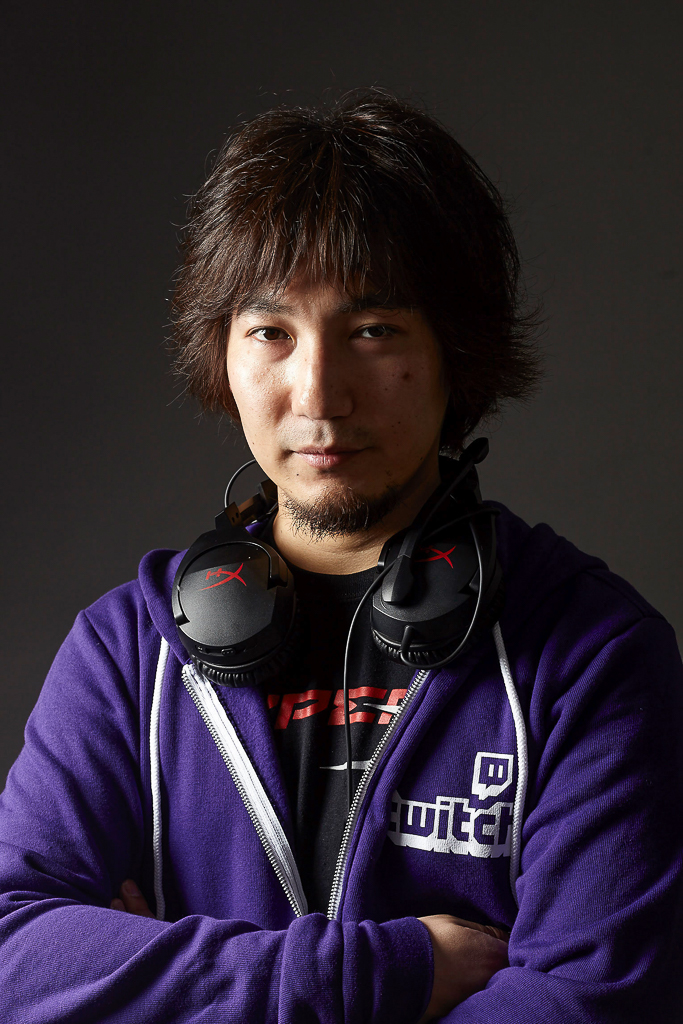
Mentality Required for Winning Matches
―You have said in talks you have given in the past that what is required to win is “to experience self-growth, to not get bored, and to transform.” But what type of mentality should people have when they are stuck in a rut where they are not able to do that?Umehara: I really think that anything is possible. I think you could get tips for winning by talking to people who have a different way of thinking than you, you could try using a different character altogether--in any case, the key is to keep acquiring information that you don’t currently have at the moment, as I think that alone is growth. I mean, just as an extreme example, I think that simply the act of talking to people who have a totally different way of thinking from you is a form of growth.
Even though “growth” itself may not change a person’s winning rate, it is building block for eventually improving your winning rate. So even if it does not lead to an increased winning rate at that moment, I think it will lead to that at some point and then it classifies as “growth.” In fact, I think it would actually be hard to maintain motivation if you do not consider that to be growth.
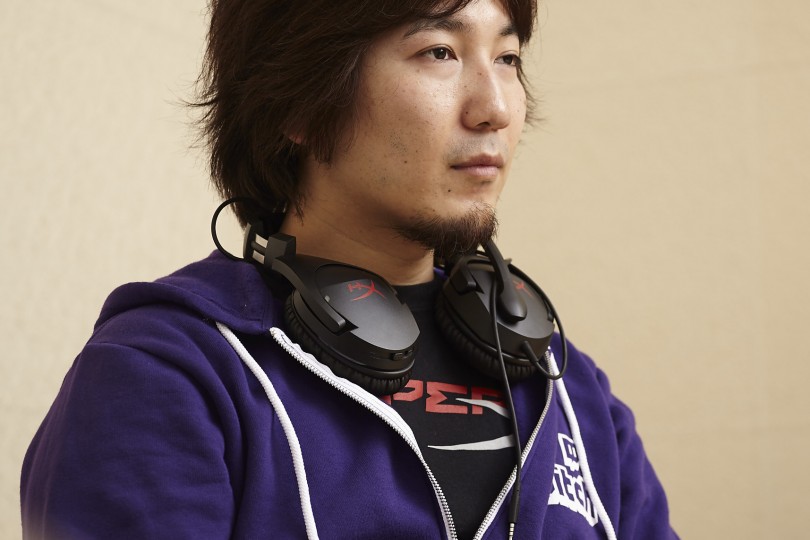
―What exactly do you do to achieve growth on a day to day basis?
Umehara: It is necessary to essentially broaden your horizons, and to change your own behavior. I think that if you change your behavior, new types of stimuli become internalized as information. You expand your thinking by repeating a pattern of doing something different from usual, and coming to understand something new as a result. If you are not able to achieve that on your own, I think talking to other people is definitely a plus, but there are an endless number of ways to go about it.
―I think people achieve growth through various different means, but do you think just seeking growth in line with your own current interests is sufficient? Or do you think that people should pursue growth by selecting a specific means for winning?
Umehara: The means I use are in line with my interests. I really think that when you prioritize one thing, you end up sacrificing another. So on the contrary, I do not prioritize. I mean, my way of doing things, and this is also written in my books, is not an approach that produces immediate results. For example, I may appear to be coming in last when viewed over a one to two year span. But once two or three years has passed, it’s like “wait a sec, I’m not losing anymore.” And this actually applies to everything I do. If some kind of results have to be produced within one year, then my laid-back way of following my whims and doing as I please is not going to cut it. So I am not saying that my approach is definitely the right one, but I am saying that eventually you can go really far by doing things this way, and eventually you can produce impressive results. In that way, it depends on what the person is hoping for. If someone wants to score 70% or 80%, then I guess any learning method that is commonly accepted in the world will do the trick.
―Are there ever times where you feel like it is extremely difficult to experience growth?
Umehara: I am always experiencing internal transformation and growth. But competing is a relative matter, so there are often times when even if I feel as though I am growing personally, in reality I am losing battles and games. Since it has only been one year since Street Fighter V was released, this is still a difficult period, and a period of adjustment for me.
Umehara keeps a daily record in order to maintain a sense of self-growth.
On Fighting Game Matches
―We are now in Season 2 of Street Fighter V, but how do you feel about your main character, Ryu?Umehara: Ryu is one of the characters whose abilities have been diminished in Season 2, and that on top of the fact that to begin with I am not the type of person who just effortlessly succeeds, makes me feel as though I am being really challenged now for the first time in a while. But I originally became a pro gamer because I felt that I wanted to be focused on and committed to something, so I have no complaints when it comes to working hard. Rather, I actually feel a sense of satisfaction.
―Are you interested in any characters other than Ryu?
Umehara: I have used several other characters. Urien, Guile, Zangief, Cammy, Nash... I think that is about it.
―In the losers’ bracket finals of the Street Fighter III: 3rd Strike match at EVO 2004, the scene which has in Japanese been coined as “the deep water reversal play,” in which you made a dramatic comeback after being cornered has become famous. But what actually goes through your head and how do you take action in times when you’re cornered?
Umehara: First of all, the most important thing is your mentality. Naturally, if I am thinking to myself “I’m screwed,” then there is no way I am going to make a comeback. So I contemplate until the very end, without giving up, how I can pull off a comeback. But even so, I think luck is involved in whether or not you can ultimately make a comeback, and your overall strength also changes depending on how focused you are, and how long you have been at it competently. The outcome of a comeback is the sum of your unwillingness to give up, your capacity to concentrate in that moment, and your overall condition.
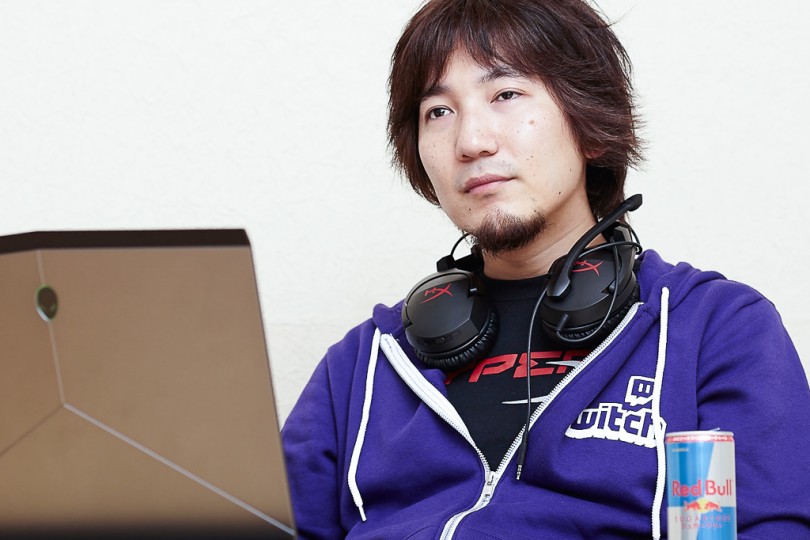
―What were you actually thinking during the match which has been coined “the deep water reversal play?”
Umehara: Based on the situation, you can sense when an opponent is going to use one of their Super Arts, or at least that was the theory, so I had come up with a method to counter that. Since I actually sensed that my opponent was going to use his Super Art, I did not have to stick my neck out and go on the offensive. I realized it was going to be a contest of whether or not I could block my opponent with the right timing when he did implement his Super Art. But if that was not the aim, then I would have had to try to attack him. I thought, if he is going to try to finish me off with his Super Art, then all I have to do is read his timing. However, I think that the matter of whether or not I could read the timing of his offensive on the dot was really just a matter of luck.
―Were you hypothesizing a few different patterns for your opponents moves?
Umehara: It is important to understand the prevailing theories at the time. If the same scenario were to play out now, I do not think there would be the same end result. Because now anyone can block those moves. The way we read situations changes with time, and based on the player’s skill level. Since that was the theory at the time, I read that he was probably going to attack, and then he actually did exactly that, but I definitely don’t think he would do the same thing now. It is important to read a player based on current theories.
―Does that mean that the important thing for winning is to understand prevailing theories and that gathering information is indispensable?
Umehara: Yeah, the guys who live in areas where they can gather lots of information have always been strong, both now and in the past. When I started gaming, the internet had not spread yet, so the skill level of people in the Tokyo arcades and those in the regional arcades was naturally different. Being armed with information makes you stronger. That is still the case now, and will always continue to be. In the current era, gathering information using the internet is in and of itself part of gaming theory, so I think a player’s diligence or commitment to getting information from the internet is going to become increasingly important.
―It is said that the mental aspect is vital to fighting games, but what kind of mindset should people have to get in the flow of winning?
Umehara: From my experience, I think that the matter of whether or not you can compete with a positive mindset, is basically determined in the preparation stage. When you feel like, “I am totally prepared to the max this time,” you can go into battle with confidence. I think that the guys who go in there thinking that they have practiced more than anyone else are also mentally strong. Because, conversely, even if other people think some guy is mentally strong, if that guy has not prepared at all then there is no basis for that. There is essentially nothing supporting him. Barring a case of severe stage fright or something, I think mental strength is decided in the preparation process.
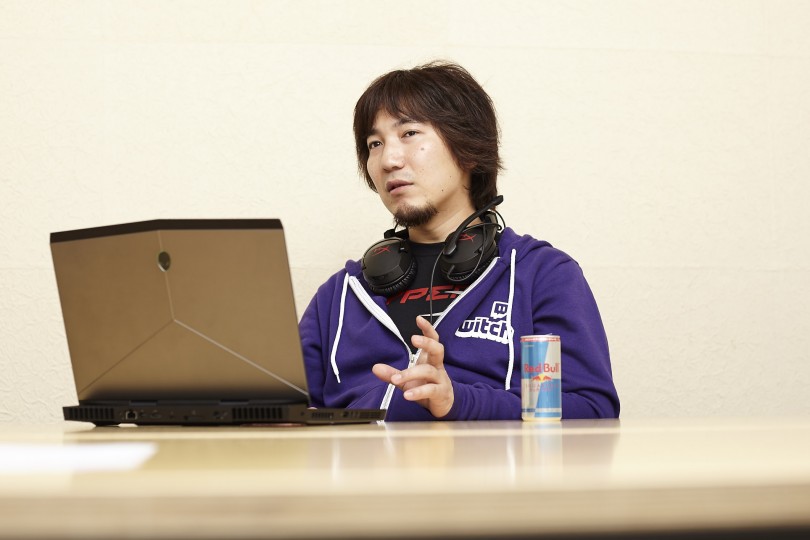
What Does it Take to Become a Pro Gamer?
―I think that other than playing video games, it is important to have personal appeal as a pro gamer, but can you tell us some points of appeal?Umehara: This changes over time. Of course being skilled at video games is a major prerequisite, but it’s not like we currently have some kind of organization like an association, so companies don’t zero in on you just for being skilled at video games. In addition to being good at video games, if you don’t have influence or that kind of star power, then ultimately there is little appeal from a business perspective. In these times, this is a difficult industry to become a pro in. I can only think of 20 some people who are famous pros in Japan. To be selected as one of the few pros, I don’t think there is just one thing you need, but you need some special element like being a community organizer, or being a good talker who is fun to listen to, or being an entertaining writer, or being English proficient, et cetera. In the end, if you don’t have something that companies can zero in on, then it is out of the question. I think that as e-sports develop more and more from here, a time will come when you can be a pro just based on your gaming skills alone, but we are still in the development stage.
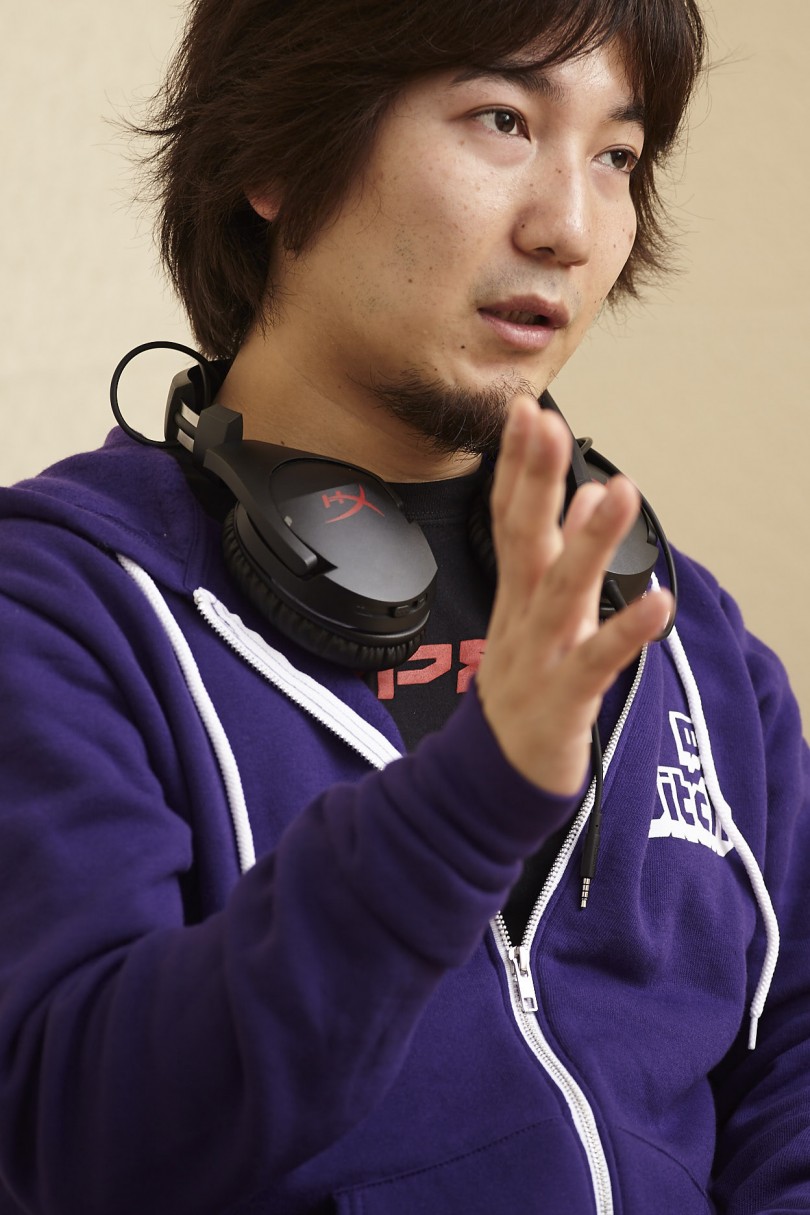
Umehara: What should you do to become a pro? What do you need to catch the attention of companies? The answer is influence and a good image. Because if you have influence and a positive image, then even if you just kick back, they should come calling. Personally, the players that I feel I like because they have a positive image, are the ones who have an individualistic way of thinking. Of course you will face opposition if you stand up and say, “This is what I think. Everyone else is saying such and such, but this is what I think.” There are probably even cases when you will be berated but, but if you can manage to stand firm with your ideas even in such cases, then I would think “I hope that guy with the strong will becomes a pro.” I am just talking about personal preferences. But since the industry is in a period of development right now, I hope that more and more of those types of people get brought in. There’s not much use in bringing in more pushover types.
―By “influence” do you mean players with a lot of fans, or a lot of viewers on niconico?
Umehara: Hmm, yeah, I guess that is influence too. But I don’t think that is the only thing. I have said in the past that in the process of delivering content, one of the major elements needed in the end is love for the community. No matter how many fans, or viewers, or followers someone has, if that person’s motivation for doing what they are doing, or passion for that field, or mission to improve that industry is not apparent, then I doubt they would have much support from everyone for their actions. So, for the sake of argument, if someone has one million followers, but only 1,000 of them back him up when something happens, then it is pointless. But if someone has 100,000 followers, and 10,000 or 20,000 of them back him up, then that is much more valuable. I think that the biggest point is how many supporters a person has when there is some risk with respect to their actions. And conversely, I think that even when you have no supporters, and nobody is assessing what you are doing, it is important to put into action anything you believe serves the greater good.
―Do you watch footage of other players’ performances?
Umehara: I do when a tournament is drawing near. I think that it is pretty normal in this day and age to watch footage of other peoples’ performances. However, I personally don’t really internalize a new approach to practicing or a new theories from watching performance videos. This was also the case with Street Fighter IV, but I felt strongly that I wanted to be left to my own devices. I have this idea that it is fine if I am slow to progress, but I want to find the solution on my own. Of course I think it is important to watch peoples’ performances, but I also think it is good to stubbornly try to do things on your own. In the world of fighting games, a period always comes when other players start to come to a standstill. When that happens, the guy who can come to the forefront, even if his speed is slow, is the strong one, when it comes down to it. That type of skill can’t be nurtured solely by internalizing the wisdom of others.
―What do you think of people who do not play video games themselves, but only watch footage?
Umehara: Until very recently it was something that I could not comprehend. I thought it was strange: “Why do they want to watch even though they don’t play? Is it really fun to just watch?” or “I wonder why they don’t play even though the barrier of entry is so low.” It’s different from baseball or soccer in that basically anyone who simply has a video game can do it. But recently I have started to understand the “video-only enjoyment” of simply watching videos. I don’t think I will ever become a video-only participant of fighting games, but I get it because I do find interest in just knowing the rules of other games. And I have a feeling that if video-only participants increase, it will stimulate the industry even more.
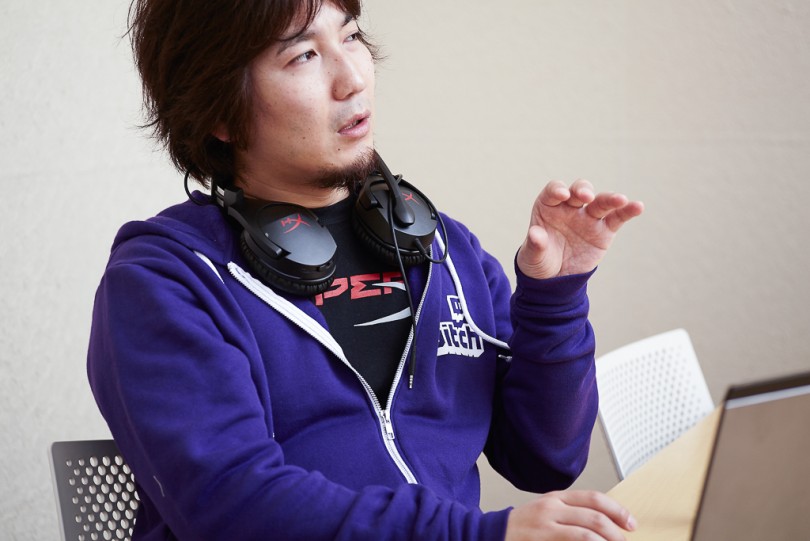
Pro Gamer Umehara’s Profile
―Approximately how many hours a day do you spend practicing?Umehara: I guess I am practicing Street Fighter V quite a bit. Yeah, ten or more hours a day. Hmm... It might be more like 12 hours on a bad day. On average, it is about ten hours. Since right now I am in a position in which I still don’t have general information on the table, I feel like I need to a put a certain amount of time into it.
―Do you take off a certain day each week?
Umehara: No, there is not a set day. But when I get an invitation to go out, like someone says “Let’s go here or there,” then I go. But even on those days, aside from whatever time window I have booked, I am playing video games. And I play every day except for when I am in an environment where I can’t play, like when I am in transit for an overseas match.
―How do you typically spend each day? Can you tell us about your daily life rhythm?
Umehara: My mornings are early. I wake up around 6 a.m., and my sleep time is hmm... it varies but, probably between 11 p.m. and 1 a.m. Well, actually, no I don’t think I am really up until 12 a.m. that often.
―Can you tell us the titles of video games that you are interested in at the moment?
Umehara: There are a ton of video games that seem super interesting. I recently went to a game show in Taiwan, and tried out an FPS game which is popular around the world right now, and it was awesome. It was my first time playing it and I had no idea about the detailed rules, but it was fun just to try it out, so I knew for sure it had to be good. Even though I knew nothing of the rules, it just felt good as a simple hands-on experience. That aside, a pro-gamer acquaintance of mine recently recommended me a certain console action game. The movie-like production and graphics were a treat.
―Let’s hear about if you will be participating in EVO Japan which is going to be held in 2018, and your expectations toward the tournament.
Umehara: I plan to participate. I hope that the event will be a chance for people who are not really interested in fighting games to get interested. Since the original EVO is becoming mainstream by reaching beyond the bounds of the fighting game community, if EVO Japan can be that type of event then I think it will be worthy of its name.
―What types of activities do you want to attempt from here as a pro gamer?
Umehara: I often say this in interviews but first of all, my sense of completion in “becoming a pro,” currently sits at about 70-80%. The biggest milestone has been my ability to actually say, “Finally, gaming is my job.” Aside from that, I also had this fantasy about how great it would be if my way of thinking and approach in the past could be made into a book, and that was actually realized. When I was an adolescent, or during my childhood, I thought it would be cool if there was a manga about me, and now I have become a manga character. I have also been able to give talks and lectures. And have had some TV and radio appearances. Really I have already been able to do everything that I have ever wanted to try or experience, at this point. I am sure other people might suggest so many other things I could do, but everything that I have personally had an interest in has been realized. But recently I have taken an interest in helping people who are aiming to become pro gamers, or people who are already pros but are not doing so well, to get on the right track. I would like to create a system for fostering the next generation.
―What should be done in Japan to make e-sports popular?
Umehara: When I was growing up people throughout the world, including the media, harshly criticized video games as something bad. I think that deep down everyone still has the image from those days, or a bad impression, ingrained in them. I suppose kids in their pre-teens and teens don’t know about those days, so they don’t have a bad or negative image of video games. When those people start to have some influence in society, I think that possibly e-sports will become as accepted as it is in the United States. Things that have been ingrained in you as a child don’t disappear. So there are times when I have had media appearances after actually becoming pro, and the ingrained thinking that video games are bad sets in, and I feel a sense of shame like “is this really okay?” I feel logically like it is the same as baseball or soccer, but that ingrained feeling makes me question if I should really be there. I think that everyone in my generation must have this feeling. Plus, the people who are working to popularize e-sports are even older than I am. So I guess they must be struggling with an even stronger notion that “video games are bad” that can’t be wiped clean. So I think e-sports will start to permeate our society more naturally with generational change, when those in their teens and 20s start to take over.
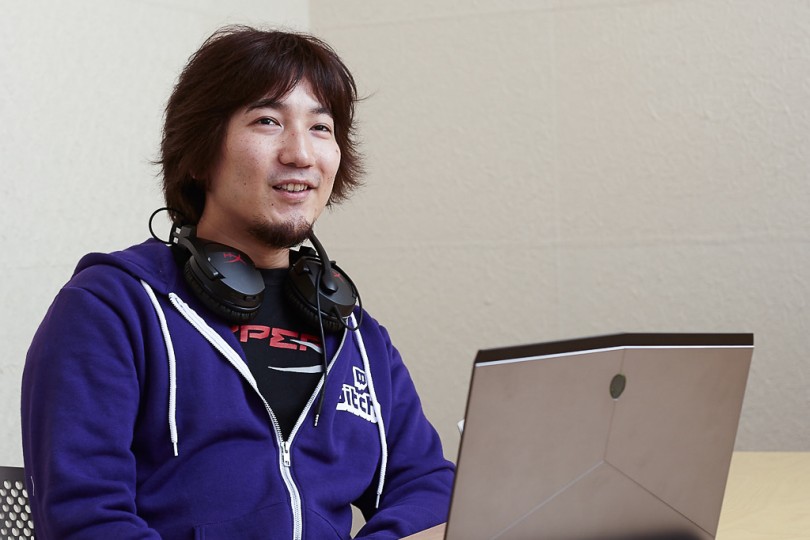
■ Gamer Umehara’s Profile
Japan’s First Pro Gamer and Proponent of Japan’s e-sports Industry
Japan’s first pro gamer, Umehara dominated Japan at age 15, and by age 17 attained the title of world champion. Ever since, he has continued to hold a top position in the world for a span of 18 years, as a charismatic figure in the fighting game industry.
In April of 2010, Umehara sealed a contract to go pro with an American company, becoming Japan’s first pro gamer. In August of the same year he was recognized by Guinness World Records as the “Most Successful Player in Major Tournaments of Street Fighter.” He won the Evolution Championship Series (abbreviated EVO; the world’s largest fighting game tournament) two years in a row in 2009 and 2010, setting an all-time record, and broke the tournament all-time record by ranking in the Top Eight for five consecutive years. As a gamer unanimously hailed as one of the strongest and best in the world, his every action garners attention from both inside and outside of Japan. With the major American gaming site Kotaku.com selecting his legendary 2004 EVO match—dubbed a “miraculous reversal”—as the number one “Best Moment in Pro-Gaming History,” there is no one in the global gaming industry who does not know the Umehara name.
Umehara has written many books on his life experiences which have been well received by a mainstream readership, and he is also active as a public speaker at company talks, universities, and vocational schools. In 2012, Shogakukan’s publication “The Will to Keep Winning: Japan’s First Pro Gamer Shares His Path to Success in Gaming and Beyond” was ranked as the bestselling book in 2013 in the Amazon Kindle store new book category, with an English version coming out in July 2016.
His Twitch channel, which launched in February of 2016, claims both the decisive number one position in Japan and the number one position globally in the fighting game category for highest viewership. In April of 2016, he entered a partnership to become a Red Bull Athlete, and was named the first Global Ambassador for Twitch, which is Amazon’s streaming platform. In December 2016, he entered a sponsorship contract with HyperX, a US-based major manufacturer of game-related equipment, followed by a sponsorship with Cygames in March 2017, making him internationally active as an athlete sponsored by four global companies.
・Major Books
The Will to Keep Winning (Shogakukan 101 Shinsho) April 2, 2012
Shoburon: Umehara no Ryugi (Shogakugan Shinsho) October 1, 2013
Ichi Nichi Hitotsu dake Tsuyoku Naru: Sekaiichi Pro Gamer no Kachi Tsudzukeru 64 no Ryugi (KADOKAWA/Chukei Publishing) July 10, 2015
Nayami Dokoro to Nige Dokoro (Shogakukan Shinsho) June 1, 2016
・Reference Books
Highly acclaimed manga series depicting Umehara’s adolescent years, in ongoing publication by Kadokawa Shoten: Umehara FIGHTING GAMERS! (Kadokawa Comics Ace)
■日本語版はこちら!
【インタビュー】世界的格闘ゲーマー梅原大吾、プロゲーマーの勝つための哲学を語る
■ Related Links
Umehara’s Official Website
http://daigothebeast.com/
Umehara’s Twitter Account
https://twitter.com/daigothebeastJP
Umehara’s Twitch Channel
https://www.twitch.tv/daigothebeastv


